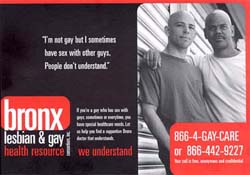
|
A total of 920 young BMSM participated in the survey, of whom 150 (16%) tested positive for HIV. Of those who tested positive, 139 were not aware of their seropositive status. Seventy-one percent of those who had a previously unrecognized infection said before testing that there was "no chance," it was "very unlikely" or it was "unlikely" that they had HIV. Overall, 64% of the young BMSM had been tested for HIV at least once before, but "few" had undergone frequent testing, despite the fact that 37% reported having unprotected anal sex in the six months prior to the survey. Among the men who had never been tested for HIV, 45% said they had not gotten tested because they thought they were at low risk for infection, 41% were afraid of learning their test results and 21% cited a fear of needles (Bingham et al., MMWR, 8/23). Reaching Out to Young Black Men Who Have Sex With Men The survey's findings were consistent with several previous studies that found that the majority of young BMSM are not aware of their HIV infection or HIV risk, according to an accompanying editorial note. To help raise risk awareness and increase testing, health providers should "routinely" assess their patients' HIV risk and encourage all high-risk MSM to take an HIV test at least once a year. Health care providers and prevention campaigns need to stress HIV risk factors, particularly among young BMSM, to increase personal risk perceptions, the editorial note says. They must also address concerns about testing positive by "conveying the benefits of early diagnosis and HIV care." Health care providers can also take some of the fear out of testing by promoting the use of oral fluid, urine-based or finger-stick HIV tests and by offering testing outside of clinical settings, the editorial note states. All HIV testing should be done in tandem with "high-quality" prevention counseling that includes an "in-depth" personal risk assessment, a clarification of risk perceptions and steps to reduce HIV risk. Providers and educators should encourage all young BMSM to use condoms consistently, even with partners who have previously tested negative for HIV, and should address the influences of alcohol, drugs and partners on condom usage. They should also take steps to "help young BMSM cope with emotional responses in high-risk situations." Prevention programs should also consider increasing condom availability in places where young BMSM are likely to meet sex partners, the editorial note says, stating that the CDC is working in partnership with state and local officials to reduce unrecognized infections and HIV transmission among young BMSM by strengthening already existing programs aimed at MSM and initiating new efforts targeted specifically at minority MSM (MMWR, 8/23). This summary is from the Kaiser Daily HIV/AIDS Report http://www.kaisernetwork.org/dailyreports/hiv provided by kaisernetwork.org), a free health policy news summary and webcasting service of The Henry J. Kaiser Family Foundation. The Kaiser Daily Health Policy Report is published for kaisernetwork.org by National Journal Group Inc. © 2002 by National Journal Group Inc. and Kaiser Family Foundation. All rights reserved |
|
© 1997-2002 BEI
The sexual orientation of individuals pictured in and writers for
Gay Today should not be assumed.
 More campaigns like this are needed, the CDC reports, in order to educate young black men of their risk of contracting HIV
More campaigns like this are needed, the CDC reports, in order to educate young black men of their risk of contracting HIV